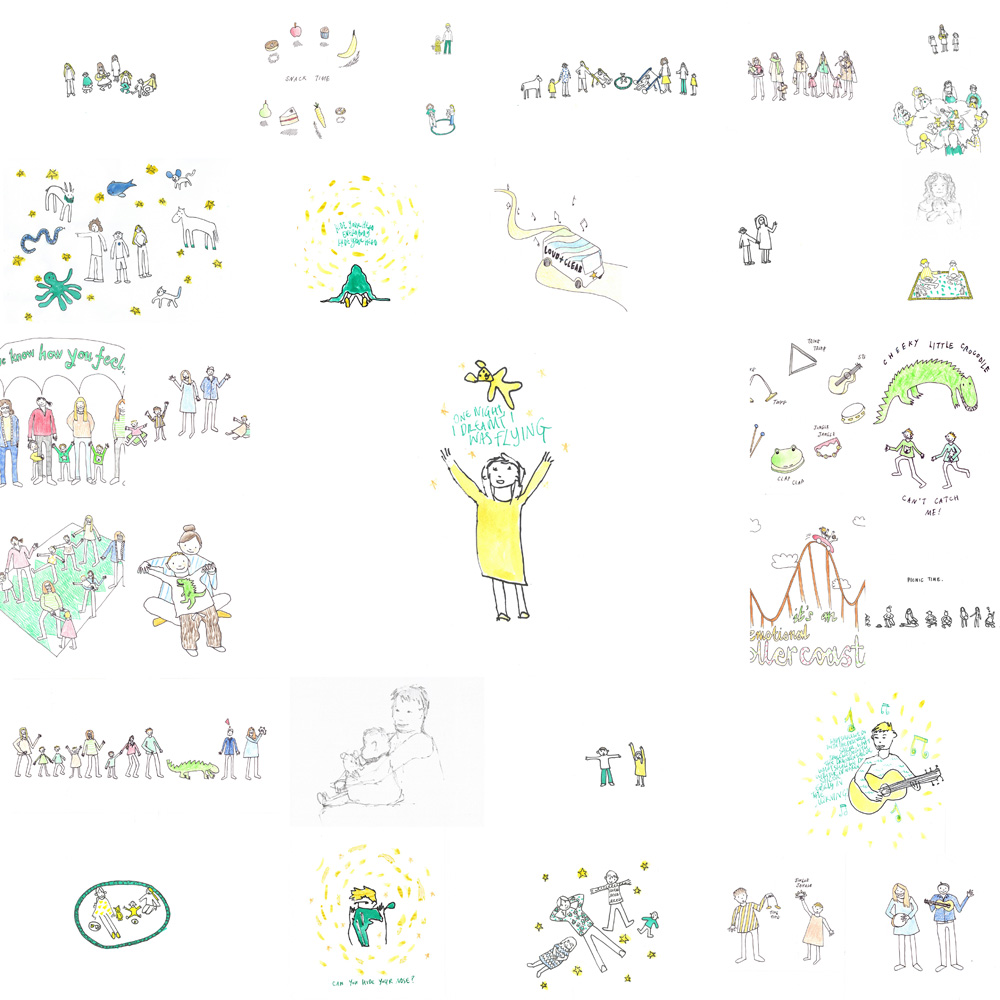Early years music making supporting looked after children (0-5 years), foster carers and adoptive parents and children based in Newcastle Gateshead.
What is the context of the work?
Since 2012, Sage Gateshead's 'Loud and Clear Early Years Family Learning Programme' ( http://www.sagegateshead.com/join-in/accessible-learning/open-access-projects/loud-and-clear-family-learning/ ) has taken place in multiple settings. These include Sage Gateshead's Music Education Centre and a residential care facility for looked-after children.

The project incorporates professional partnerships between musicians, local authority foster care support staff, local authority adoption support staff and community foster carers.
Eleanor Mooney is the programme leader and leads project content and activity, along with a team of specially-trained early years musicians employed by Sage Gateshead's Learning and Participation department.
The initial design and implementation of the project was heavily influenced by Chambers and Petrie's Learning Framework for Artist Pedagogues (2008) ( http://network.youthmusic.org.uk/resources/visualisations/social-pedagogy-looked-after-children ). This utilises a Social Pedagogy approach to educational work with looked after children, suggesting guidelines for artistic and creative practitioners to ensure that their work is enacted in the best interests of potentially vulnerable and young participants.
What is the content of the work?
The programme supports the musical, personal, emotional and communication development of particular focus groups of early years children (looked-after, adopted children and children on the edge of care), and helps to build and nurture relationships between these children and their birth families, foster carers, adoptive parents and peers or siblings.
Weekly, hour-long music making sessions are held for foster family groups, with a separate weekly session for adoptive family groups. These are co-led by two experienced early years musicians. Activities include singing, movement, cooperative activities – such as playing with Lycra and scrunchies, playing with and exploring percussion instruments, singing lullabies to promote attachment and establishing familiar and favourite nursery rhymes and songs for individual children. The wider non-musical aims include the promotion of the establishment of domestic routine and to also support transition for children moving from care into their adoptive families, or returning to their birth families. Song bags and song books have been developed for the children – in partnership with foster carers – to ensure that participant looked-after children are able to take with them the music that they have learned and enjoyed in music sessions as they transition from their current foster carer to adoption, or back to birth families, or to another carer.
Throughout the programme, all music session content is informed by both the national statutory Early Years Foundation Stage framework (EYFS www.foundationyears.org.uk/eyfs-statutory-framework/), as well as Sage Gateshead's approach to early years pedagogy. This pedagogical approach promotes music making in early childhood as a key support for the development of children's speech, language and communication skills, alongside support for their physical, social and emotional wellbeing and the development of positive, playful relationship with others through music.
The programme also provides music training for foster carers, local authority partner staff and adoptive parents to support them in continuing and embedding music making in the home and in the daily lives of children in their care. Aspects of this training are mapped to the Childcare Development Workforce Council's (CDWC) Foster Carer Training Standards. This enables foster carers more easily to align their new skills with their ongoing training and professional development.
What are the key features of the teaching and learning approach?
Within the Loud and Clear Early Years Family Learning Programme, the specially-trained project musicians enable children and carers to explore and investigate music-making freely through hands-on play and group participation. This approach:
- Encourages and values children's creative ideas and contributions;
- Enables continuous engagement in musical learning;
- Supports working through musical challenges;
- Celebrates achievements;
- Encourages and develops children's confidence, both musical and social; and
- Supports the ongoing development of positive and playful carer/child relationships. The shared central tenet of Sage Gateshead's early years pedagogy and of this project is that young children and adults alike learn most successfully when they are enjoying themselves, having fun and are supported in a positive way that allows for learner agency and adventurousness.
As mentioned above, the work is grounded in a Social Pedagogy approach, using head, heart and hands through which musicians support and work alongside children and carers as they progress musically and emotionally within the project. The work is also influenced by the Learning Framework for Artist Pedagogues (Chambers and Petrie, 2008).
How is the work being reviewed?
The work is reviewed yearly in an evaluation report compiled and written by the programme leader and external evaluators who have experience in early years music education, artistic work with looked-after children and social pedagogy. Evidence for these reports is gathered through multiple means over the course of each year. Sources include:
- Semi-structured interviews with adult project participants, e.g. musicians, foster carers, community foster carers, adoptive parents and local authority partner staff;
- Reflective focus group conversations with participating foster carers and adoptive parents;
- Participant and non-participant observations carried out by external evaluators of music-making activity;
- Where possible, given the young age of child participants, asking children for their feedback about the music making; and
- Developing case studies of specific looked after children and foster carers participating in the programme over the course of two or more years.
What are the positive outcomes for children/young people – are they some or all of musical, social, personal, educational - how and when can they be identified?
The evidence gathered through the yearly evaluation process suggests that the project has impacted positively upon the children involved, particularly those whose placements were long enough to enable them to participate for the duration of the project. Key impacts of the project noted within the evidence base are musical, social, emotional, personal and educational. These include evidence of:
- Increased confidence to contribute to and to engage with group music making;
- Increased confidence and ability to verbalize and/or sing within sessions;
- Increased ability to focus for extended lengths of time within music sessions;
- The building of playful relationships with carers, musicians and other children through musical activity;
- Recognition of established routines within the music sessions that could be transferred with positive effect into the home environment;
- Increased response to sung instructions;
- Improved social skills – increased confidence to play and interact with unfamiliar adults and children;
- Children being supported to learn how to play, both independently and with others;
- Supported physical development though music and movement activity;
- Recognition of familiar tunes and the establishment of shared family 'favourites';
- Recognition of established routines within the music sessions that could be transferred with positive effect into the home environment;
- Children with special educational needs and learning disabilities were noted to have made developmental progress through weekly engagement with repetitive musical activity and routine;
- Increased ability of children to cooperate and to share with one another, alongside increased resilience in the face of disappointment when a favourite toy or instrument was chosen by another child first; and
- Specific evidence of positive effect of regular singing on particular children's speech and language development.
What are the key features of teacher/leader behaviour that are enabling those positive outcomes?
The following skills and characteristics of musicians' practice enabled the aforementioned positive outcomes for children in the context of this programme:
- Sensitive practitioner - Extended understanding, acquired through education, training and practical involvement in the programme, of the foster carer role and issues commonly faced by carers, looked after children and local authority partner staff. Understanding of the needs of adoptive families and the issues pertinent to them. Knowledge of the role of community foster carers. Professional sensitivity with regard to working with children and families on the edge of care;
- Flexible approach – Able to respond 'in the moment' to child and adult participants' needs, requests and ideas. Able to take an improvisational approach at times, along with possession of an extensive music repertoire knowledge that can be adapted on the spot to suit the creative moment;
- Positive relationships – Able to facilitate and support the development of positive relationships between children and adult carers and children and their peers through music making activity;
- Culturally appropriate – Ability to plan and lead musical content which is appropriate and sensitive to the circumstances of individual participants, taking into account ethnicity, religion, gender, sexual orientation of parents/carers and the often changing domestic circumstances of many of the children involved. For example, taking care over use of the words 'mummy' or 'daddy' within specific songs and making appropriate substitutions where necessary;
- Based on EYFS overarching principles – Honouring the uniqueness of each child. The musical practitioners get to know the children, their interests in their everyday environment not just in the musical space to enrich musical play and dialogue;
- Reflective practice – Supported by the ongoing evaluation enquiry connected to the project for which the musicians keep reflective journals on the progress of each week's sessions; and
- Collaborative practice – Musicians work in pairs, planning and reflecting together. Also, musicians work in collaboration with local authority foster care and adoption support workers to achieve all of the above aspects of effective practice in relation to this programme.
What are the key features of context, content and activities that are enabling those positive outcomes?
The consistent leadership of music sessions by familiar, experienced and friendly musicians has been reported by the participant foster carers and adoptive parents to have had a positive impact on the atmosphere of sessions, the children's weekly progress and a feeling of familiar safety within sessions.
The regular, weekly sessions and holiday activity was felt by adult participants and musicians to support increased and speedier familiarity and camaraderie among all participants, alongside enabling the children and foster carers to embed their project related learning week-on-week.
In addition, the central location of the music session venue was felt to support the programme's success by the carers due to its close proximity to a major public transport interchange.
Foster carers who attended the professional development musical training offered as part of the programme reported that this component enabled them further to extend and deepen their knowledge and skills in relation to practical music-making and its potential benefits for the children they look after. As a result, they were able to provide increased amounts and variety of music-making activity and opportunities for the children outside of the project music sessions, thus enabling the children further to practice and develop their musical skills and the associated outcomes listed above.
What other factors in this case are contributing to those positive outcomes?
Other contributory factors to positive outcomes include:
- Foster carers, adoptive parents, project musicians and local authority staff feeling more confident about using music as a 'tool' to build attachment;
- Foster carers, adoptive parents, project musicians and local authority staff feeling more able to use songs to assist in moments of difficulty with children; and
- Foster carers and adoptive parents making friends with other families in the same situation through the project and being able to build supportive networks.
How replicable or adaptable is it?
The programme was originally funded by Youth Music and, if adequate funding is identified and secured, is certainly replicable and adaptable. Suitable training would be required for musical practitioners and such work would ideally be developed and carried out in partnership with relevant local authority foster care and adoption services. Advice on how replication of the programme might be realised can be secured from either Eleanor Mooney, Programme Leader for Loud and Clear at Sage Gateshead or Julia Partington, project evaluator 2012 – 2014 (see http://www.sagegateshead.com/comusica/comusica-inclusion/delivery/lac-looked-after-children/lac-early-years/ ) and inspire-music working group member.
